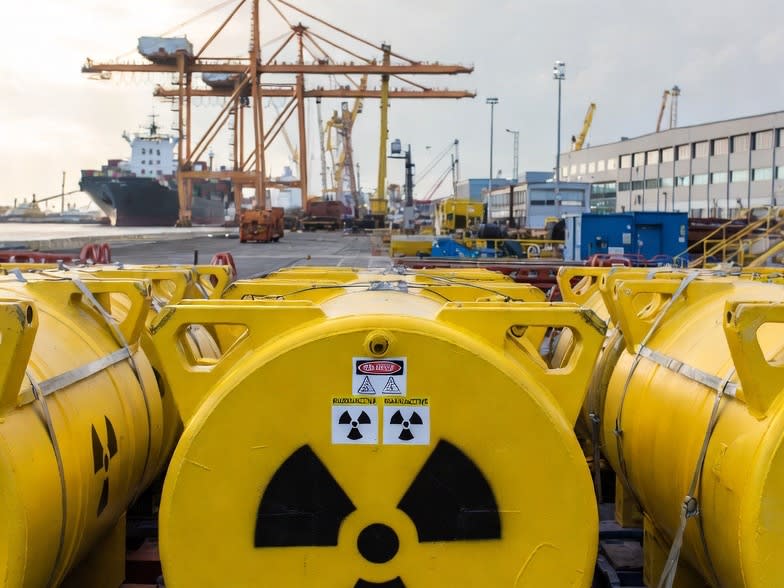10 Things Global News - 17th November 2025
Interesting and important news from around the world
Trump Backs Epstein Files Release
US Carrier Ramps Up Venezuela Pressure
Ecuador Rejects Foreign Military Bases
Mass Protests Over Philippine Corruption Scandal
Iran Signals Openness to Nuclear Talks
France Resumes Uranium Exports to Russia
China Steps Up Pressure On Japan Over Taiwan
Japan Eyes Major Stimulus After GDP Fall
China Ties Expose UK Tech Security Risks
Clashes Mar Mexico City Anti-Crime Protests
On this day ….
On this day in 1869 the Suez Canal opened, providing a direct link between the Mediterranean and the Red Sea and sharply reducing travel time between Europe and Asia.
Its creation changed global trade patterns and gave new strategic weight to Egypt, making the waterway a focal point for colonial interests, modern commercial shipping and, more recently, geopolitical tension. Even today, disruptions along its narrow route can affect global supply chains within hours.
The canal’s history shows how a single piece of infrastructure can alter international power dynamics.
President Trump has reversed his position and is now urging House Republicans to vote to release the Epstein files, saying his administration has “nothing to hide.” His shift follows days of pressure inside the party as dozens of Republicans signalled support for a measure compelling the Justice Department to release the material.
As a result, a House vote is expected this week, with Speaker Mike Johnson predicting “lots of votes” in favour of the bill.
The reversal also comes amid renewed scrutiny of Mr Trump’s ties to Jeffrey Epstein after a large release of emails in which Epstein made claims about the president’s past contact. However, Mr Trump has dismissed the matter as a “Democrat Hoax” designed to deflect from Republican successes, including the recent shutdown outcome.
Meanwhile, the issue has widened divisions within the party, with Mr Trump withdrawing his endorsement of Representative Marjorie Taylor Greene and escalating his criticism of her.
Sources: NPR, New York Times
The United States has intensified pressure on Venezuela with the arrival of the USS Gerald R. Ford and other warships in the Caribbean, marking the largest regional build-up of American firepower in generations. Washington says the mission is aimed at stopping drug shipments, yet officials have released no evidence that those killed in recent strikes were “narco-terrorists”. Since September, at least 80 people have died in 20 such attacks.
President Trump has meanwhile said the US “may be having some discussions” with Nicolás Maduro, though he provided no details. However, the Venezuelan leader has accused Washington of “fabricating” a war and has touted a “massive” mobilisation to defend against possible US action.
The deployment has heightened regional unease, as US officials stress the need to counter transnational threats while training with forces in nearby Trinidad and Tobago.
Sources: South China Morning Post, Sydney Morning Herald
Ecuadorian voters have rejected a proposal to allow the return of foreign military bases, with nearly two-thirds voting “no” after almost 90% of ballots were counted. The measure was one of several backed by President Daniel Noboa, who argued that foreign cooperation was central to tackling organised crime.
However, the result marks a significant setback for his security agenda. A parallel proposal to convene a constitutional assembly also faced more than 61% rejection, underscoring widespread public resistance to his political reforms.
The vote took place amid escalating violence linked to drug trafficking networks that have turned Ecuador into a major transit corridor. However, sovereignty concerns and anger over Noboa’s recent cancellation of a diesel subsidy also influenced public sentiment.
Meanwhile, two further proposals — to reduce the size of the legislature and cut public funding for political parties — similarly appeared on track to fail by wide margins. As a result, analysts said the outcome could weaken Noboa’s political standing at a time when the country faces unprecedented security pressures.
Sources: Reuters, Al Jazeera
Hundreds of thousands of people gathered in Manila on Sunday to demand accountability for a vast flood-control corruption scandal implicating powerful legislators and senior officials. The rally at Rizal Park, led by the influential Iglesia Ni Cristo, drew an estimated 650,000 participants and became the largest mobilisation yet in a growing wave of public anger.
The protests follow revelations that thousands of flood-defence projects were substandard, incomplete or non-existent despite extensive spending since 2022.
The scandal has intensified pressure on President Ferdinand Marcos Jr., as criminal complaints for graft, corruption and plunder are filed against dozens of suspects, including construction executives and government officials. Several senior lawmakers have resigned after being linked to alleged kickback schemes.
Flooding is a deeply sensitive issue in a country repeatedly struck by deadly typhoons, so the affair has broadened into a wider reckoning over political accountability and, as a result, risks engulfing Marcos’s administration.
Sources: Associated Press, The Diplomat
Iran’s foreign minister says Tehran is prepared to restart nuclear negotiations with the United States if approached with “dignity and respect”, signalling conditional openness to renewed talks after dialogue collapsed in June. Abbas Araghchi said intermediaries have made fresh requests to reopen discussions, but stressed that Iran will not negotiate from what it sees as a position of weakness after the Israeli-US attacks on its nuclear sites during the 12-day war.
The previous five rounds of indirect talks ended abruptly following those strikes, and Tehran has refused UN inspectors access to bombed facilities on security grounds. Araghchi restated that Iran has an “inalienable right” to enrich uranium domestically, the core sticking point in earlier negotiations.
He also warned that Washington “cannot expect to gain what it couldn’t in war” and insisted diplomacy is only possible on “equal and fair” terms.
Sources: The Guardian, The Straits Times
France has resumed shipments of reprocessed uranium to Russia for conversion work, with Greenpeace documenting the loading of at least 10 containers onto the Mikhail Dudin in Dunkirk.
The export is the first the group has observed in more than three years and marks a renewed phase of cooperation between France’s nuclear sector and Russia’s state company Rosatom. However, the shipment has prompted sharp criticism from Greenpeace, which argues the trade contradicts wider European efforts to reduce dependence on Russian energy.
The French government previously ordered EDF to halt these exports in 2022 after Greenpeace revealed earlier transfers, yet relations resumed despite the continuing war in Ukraine. However, the French industry relies on Russia because Rosatom operates the world’s only facility capable of converting reprocessed uranium, meaning most of the material sent there remains stored as waste in Siberia.
Greenpeace claims this dependence undermines France’s energy-sovereignty goals.
Sources: France 24, Greenpeace
China has sailed coast guard vessels through the waters of the Senkaku islands and flown military drones near outlying Japanese territory, amid rising tensions over Japanese prime minister Sanae Takaichi’s remarks that Tokyo might respond militarily to an attack on Taiwan. Beijing said the patrols were lawful operations to uphold its “rights and interests”, while also demanding a retraction from Tokyo.
The activity came as Taiwan reported the presence of 30 Chinese military aircraft, several navy ships and an official vessel around the island in the past 24 hours. Maps released in Taipei showed drones passing close to Yonaguni, Japan’s westernmost island. Meanwhile, China escalated diplomatic and economic pressure, summoning Japan’s ambassador, issuing travel warnings, and prompting Chinese airlines to offer free ticket changes.
However, the dispute has broadened, with China urging students to reconsider studying in Japan and state media warning that any clash could draw in the United States. Japan has traditionally maintained “strategic ambiguity” over Taiwan, but Beijing’s rhetoric has sharpened after Takaichi linked Japan’s security directly to the island’s fate.
Sources: The Guardian, Al Jazeera
Japan’s economy contracted for the first time in six quarters, reinforcing Prime Minister Sanae Takaichi’s case for a major fiscal package as the government confronts weak private demand and rising living costs.
Official data showed GDP shrinking at an annualised 1.8% in the third quarter, driven by a sharp decline in housing investment and lacklustre consumer spending. However, capital spending remained resilient, reflecting firms’ efforts to manage labour shortages and competition.
The fall in output has strengthened expectations that Takaichi will unveil an ambitious stimulus exceeding ¥17 trillion, with measures likely to include winter subsidies for electricity and gas bills and expanded local support schemes.
Meanwhile, the scale of the package could test fiscal discipline as the central bank considers a possible rate rise in the coming months. Analysts are watching how the latest data influences the government’s coordination with the Bank of Japan ahead of its December policy decision.
Sources: Bloomberg, Japan News
China’s investment push into the UK has again raised concerns over the transfer of strategically sensitive technology, after a BBC investigation found that Chinese-linked ownership of Imagination Technologies enabled expertise to move to China. The company’s former CEO said he was asked to oversee a direct transfer of its semiconductor know-how, which he believed could have military applications. However, he said UK officials initially viewed the issue as a private commercial matter.
The systemic nature of the risk became clearer as a separate report revealed the British Army has been using Chinese-made 3D printers to produce fast FPV drones during exercises. However, security experts warned that firms in China can be compelled to share data with the state, raising concerns about defence systems’ exposure.
Taken together, the two developments highlight the persistent challenge of balancing foreign investment, economic pressure and national security.
Sources: BBC, Daily Mail
Thousands of people marched through Mexico City to protest crime, corruption and impunity, in a demonstration initially organised by Generation Z but later joined by older supporters of opposition parties. The rally drew diverse groups to the Zócalo, where frustration with violence and recent high-profile murders has intensified criticism of President Claudia Sheinbaum’s security policies.
The protest remained mostly peaceful for hours; however, clashes erupted when masked demonstrators tore down metal barriers and threw stones, fireworks and paving blocks at police. Security forces responded with tear gas and fire extinguishers. According to officials, 120 people were injured, including 100 police officers, and 20 were arrested.
Meanwhile, some participants displayed symbols associated with the murdered Michoacán mayor Carlos Manzo, whose anti-cartel campaign had inspired part of the movement, though his widow distanced herself from the rally. The unrest reflected wider Gen Z activism seen globally this year.
















